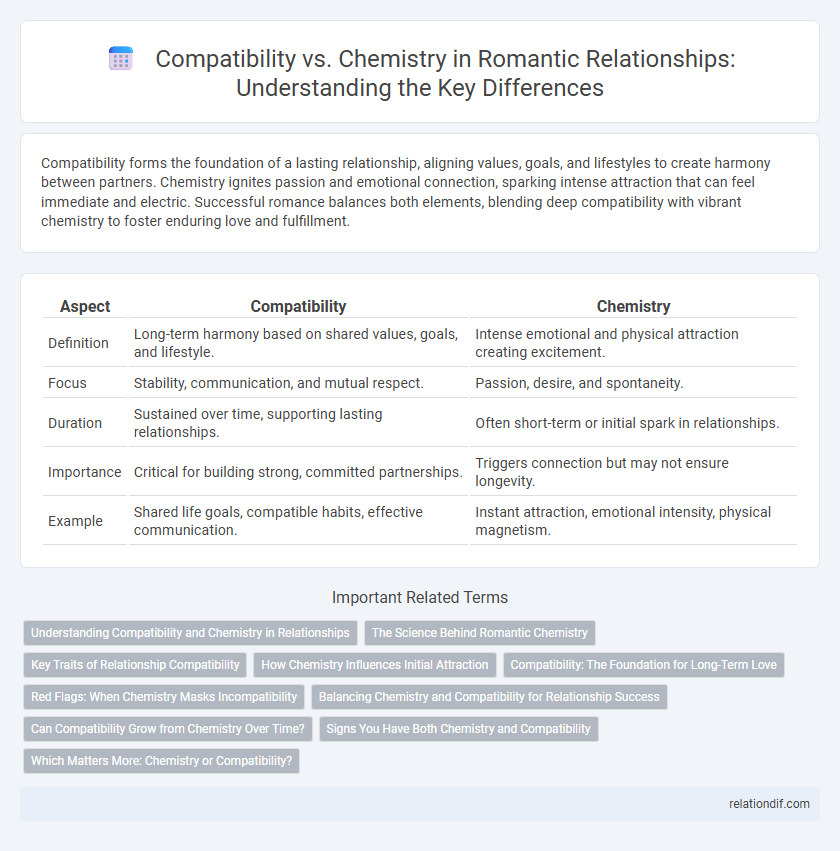Compatibility forms the foundation of a lasting relationship, aligning values, goals, and lifestyles to create harmony between partners. Chemistry ignites passion and emotional connection, sparking intense attraction that can feel immediate and electric. Successful romance balances both elements, blending deep compatibility with vibrant chemistry to foster enduring love and fulfillment.
Table of Comparison
| Aspect | Compatibility | Chemistry |
|---|---|---|
| Definition | Long-term harmony based on shared values, goals, and lifestyle. | Intense emotional and physical attraction creating excitement. |
| Focus | Stability, communication, and mutual respect. | Passion, desire, and spontaneity. |
| Duration | Sustained over time, supporting lasting relationships. | Often short-term or initial spark in relationships. |
| Importance | Critical for building strong, committed partnerships. | Triggers connection but may not ensure longevity. |
| Example | Shared life goals, compatible habits, effective communication. | Instant attraction, emotional intensity, physical magnetism. |
Understanding Compatibility and Chemistry in Relationships
Compatibility in relationships involves shared values, goals, and lifestyle preferences that provide a stable foundation for long-term connection. Chemistry refers to the immediate emotional and physical attraction that sparks excitement and desire between partners. While chemistry ignites passion, compatibility sustains a relationship through mutual respect, effective communication, and aligned expectations.
The Science Behind Romantic Chemistry
Romantic chemistry involves an intense emotional and physical attraction driven by neurochemical responses such as dopamine, oxytocin, and adrenaline, which stimulate pleasure and bonding. Compatibility, however, is rooted in shared values, beliefs, and long-term goals that facilitate relationship stability and growth. Understanding the science behind romantic chemistry helps distinguish fleeting passion from enduring partnership, highlighting the balance between emotional sparks and cognitive alignment.
Key Traits of Relationship Compatibility
Relationship compatibility hinges on shared values, communication styles, and emotional goals that align partners for long-term harmony. Trustworthiness, empathy, and conflict resolution skills are key traits fostering deeper connection and stability. Chemistry sparks attraction and passion, but compatibility sustains enduring love through mutual understanding and respect.
How Chemistry Influences Initial Attraction
Chemistry plays a crucial role in initial attraction by triggering intense emotional and physical responses that create an immediate connection between individuals. This spontaneous spark often overshadows compatibility, which involves deeper alignment of values, goals, and lifestyles. While chemistry ignites the desire to pursue a relationship, compatibility determines its long-term success and stability.
Compatibility: The Foundation for Long-Term Love
Compatibility forms the foundation for long-term love by aligning values, goals, and lifestyles, ensuring sustainable relationship growth. While chemistry ignites passion and emotional connection, compatibility nurtures mutual respect, effective communication, and shared visions for the future. Couples with strong compatibility experience greater relationship satisfaction and resilience through life's challenges.
Red Flags: When Chemistry Masks Incompatibility
Red flags often emerge when intense chemistry obscures fundamental incompatibility in a romantic relationship. Emotional attraction can create a misleading sense of connection, overshadowing conflicting values, goals, and communication styles that undermine long-term compatibility. Recognizing these warning signs early helps prevent heartbreak and promotes healthier, more sustainable partnerships.
Balancing Chemistry and Compatibility for Relationship Success
Balancing chemistry and compatibility is essential for relationship success, as chemistry provides the emotional intensity that ignites attraction, while compatibility fosters long-term harmony through aligned values and lifestyles. Couples who nurture both elements build connections that are passionate yet sustainable, reducing conflicts and enhancing mutual understanding. Prioritizing compatibility alongside undeniable chemistry creates a resilient foundation that supports growth and enduring love.
Can Compatibility Grow from Chemistry Over Time?
Chemistry often sparks immediate attraction, but true compatibility requires shared values, communication, and mutual respect that develop over time. Couples with strong chemistry can cultivate deeper compatibility through experiences and intentional efforts to understand each other's needs. Sustained relationship growth depends on transforming initial passion into a balanced partnership grounded in trust and emotional support.
Signs You Have Both Chemistry and Compatibility
Experiencing both chemistry and compatibility in a relationship is marked by intense emotional and physical attraction alongside shared values, goals, and communication styles. Signs include effortless conversations mixed with passionate connection, mutual respect for individuality, and synchronized life priorities that foster long-term harmony. Couples who exhibit these traits often report a balanced dynamic where excitement and stability coexist, enhancing relationship satisfaction.
Which Matters More: Chemistry or Compatibility?
Chemistry sparks initial attraction through intense emotional and physical connection, while compatibility ensures long-term harmony by aligning values, goals, and lifestyles. Couples with strong chemistry but low compatibility often face conflicts and misunderstandings, whereas compatible partners may develop deeper intimacy and lasting satisfaction. Prioritizing compatibility tends to foster sustainable relationships, though maintaining a balance with chemistry can enhance emotional fulfillment.
compatibility vs chemistry Infographic

 relationdif.com
relationdif.com